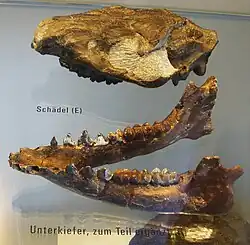Microbunodontinae
The microbunodontines were an extinct subfamily of anthracotheres that were predominately a Paleogene group of Eurasian artiodactyls. The group died out at the end of the Late Miocene. It comprised the genera Anthracokeryx, Geniokeryx, Microbunodon, and possibly Etruscotherium.[3][4][5] They are different from the other anthracothere lineages by their smaller size, slenderer limbs and male specimens having laterally compressed, longer canines. They were originally classified as members of the other subfamily of anthracotheres, Anthracotheriinae but recent phylogenetic studies have found them to be their own clade sister to Bothriodontinae.[1][2]
| Microbunodontinae Temporal range: | |
|---|---|
 | |
| Skull and jaws of Microbunodon | |
| Scientific classification | |
| Domain: | Eukaryota |
| Kingdom: | Animalia |
| Phylum: | Chordata |
| Class: | Mammalia |
| Order: | Artiodactyla |
| Superfamily: | Hippopotamoidea |
| Family: | †Anthracotheriidae |
| Subfamily: | †Microbunodontinae Lihoreau & Ducrocq, 2007 |
| Genera[1][2][3] | |
| |
References
- Lihoreau, F.; Ducrocq, S. (2007). "Family Anthracotheriidae". In Prothero, D.R.; Foss, S.E. (eds.). The Evolution of Artiodactyls. The Johns Hopkins University Press. pp. 89–105. ISBN 9780801887352.
- Lihoreau, F.; Boisserie, J-R.; Manthi, F. K.; Ducrocq. S. (2015). "Hippos stem from the longest sequence of terrestrial cetartiodactyl evolution in Africa". Nature Communications. 6: 6264. Bibcode:2015NatCo...6.6264L. doi:10.1038/ncomms7264. PMID 25710445. S2CID 35257041.
- Stéphane Ducrocq (2020). "Taxonomic revision of Anthracokeryx thailandicus Ducrocq, 1999 (Anthracotheriidae, Microbunodontinae) from the Upper Eocene of Thailand". Vertebrata PalAsiatica. 58 (4): 293–304. doi:10.19615/j.cnki.1000-3118.200618.
- Ducrocq, S.; Chaimanee, Y.; Jaeger, J.-J.; Yamee, C.; Rugbumrung, M.; Grohé, C.; Chavasseau, O. (2021). "New fossil remains from Bang Mark locality, Krabi Basin, southern Thailand" (PDF). Journal of Vertebrate Paleontology. 41 (4): e1988624. doi:10.1080/02724634.2021.1988624. S2CID 244781496.
- Pickford, M. (2021). "Europe's last anthracothere (Artiodactyla, Mammalia) from Ribolla (MN 12) Italy" (PDF). Historical Biology: An International Journal of Paleobiology. 34: 85–93. doi:10.1080/08912963.2021.1900169. S2CID 233686772.
This article is issued from Wikipedia. The text is licensed under Creative Commons - Attribution - Sharealike. Additional terms may apply for the media files.